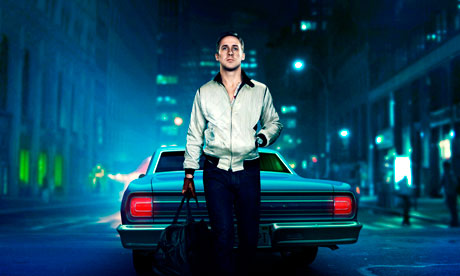
By day, the mysterious, taciturn young man (Gosling) works as a Hollywood stuntman and a mechanic at a dirty Los Angeles garage, while by night, as a driver with inhuman skills, he lends his services to criminals. His idyllic, peaceful triple life becomes complicated when he falls in love with his beautiful neighbour (Mulligan) with a small child and a husband in prison.
Numerous enthralled critics and viewers characterised Drive as “one of the greatest surprises of 2011” and a “Tarantinoesque film”. The latter notwithstanding, instead of a postmodern pastiche, a citation of and homage to road movies, heist films, film noir and 1980s cinema, Refn actually managed to create something more: he merged all the mentioned references into a unique whole, an entirely new model of auteur genre film for the new millennium, which simultaneously shocks and seduces with its honest mixture of brutality and elegance, existentialism and romance. Drive is Frankenstein’s monster built piecewise by Walter Hill, Monte Hellman, Richard Sarafian, Dennis Hopper, Robert Bresson, Nicholas Ray, Chris Petit, Wim Wenders, Clint Eastwood, Warren Oates and Steve McQueen, but it is a seamless monster that learned to walk in Victor Erice’s school.
Drive was adapted from the eponymous novel by James Sallis (who last year already followed up his instantaneous 2005 literary cult with a novel published under no less a laconic title, Driven). On the level of the story, the plot, and partly also the level of dramaturgy, it does not bring anything essentially new. The fundamental surplus, the very core of the film, lies in its form, in the exclusive authorial signature of Nicolas Winding Refn. As with his previous masterpiece Valhalla Rising (2009), we could again say that the story (or its germs) arise from the form, from the audiovisual, that is, the inherently filmic. Similarly, the surplus of Sallis’ novel lies almost exclusively in its form, a crossbreed between Carver, Bunker and Chandler. This admittedly evident thesis is confirmed by Refn himself, who tersely and wittily characterises Drive as a story “about a man who drives around listening to pop songs at night.” In short, the main hero’s character does not proceed from any in-depth psychology, or even a surface one, but is born entirely out of the mentioned night melodies that surround him, from the monumental way he is filmed, from the unexplained drive that propels him from scene to scene, from one story line to another, from one gear to another, to the end and beyond. It concerns real mythology, a timeless film for every moment.
“A brilliant piece of nasty business that races on a B-movie track until it switches to the dizzying fuel of undiluted creativity. Damn, it’s good. You can get buzzed just from the fumes coming off this wild thing.” Peter Travers
http://www.isolacinema.org/en/programme/films-and-sections/drive

No comments:
Post a Comment